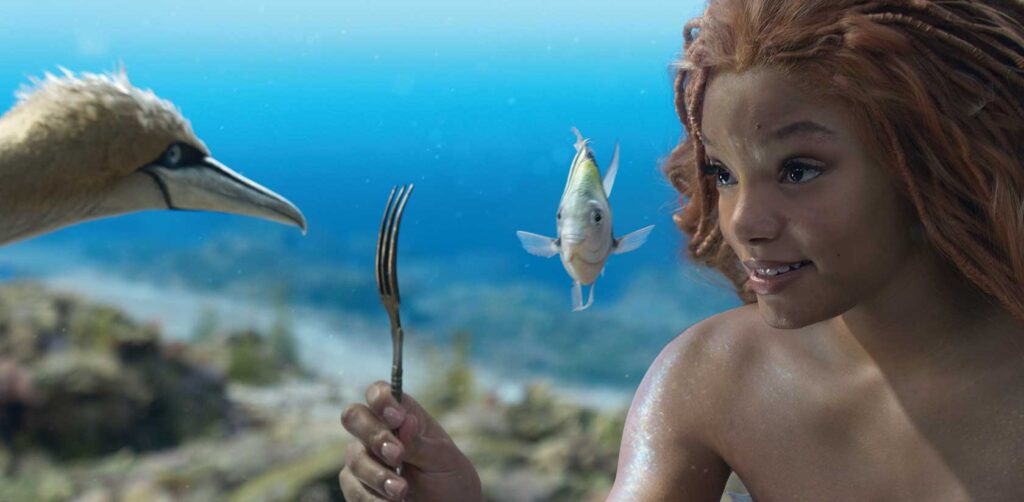‘The Little Mermaid’ doesn’t take itself seriously, and neither should you

“The Little Mermaid” was mired in controversy when it was announced that singer and actress Halle Bailey was cast as Disney’s new Ariel last year. Critics and internet trolls were enraged that the fantasy creature and former animated character was played by an African American actress. The sad thing is the trolls took the movie more seriously than necessary. “The Little Mermaid” is a CGI-fueled fairy tale that doesn’t take itself too seriously and asks audiences to have fun, sing along, and maybe think about the coral reefs and bridging cultural gaps.
The movie follows the curious and strong-minded mermaid, Ariel (Bailey), who yearns to explore the human world that killed her mother. Her strict father King Triton (Javier Bardem) forbids her from reaching the ocean’s surface and interacting with humans. Of course, Ariel doesn’t listen, and not only does she reach the surface, she also falls in love with Eric (Jonah Hauer-King), the prince of the nearby Caribbean island. Ariel decides to take a shot at love and makes a Faustian bargain with the deceitful Ursula (Melissa McCarthy) by giving up her siren song of a voice for a pair of killer legs and mutism.
One of the film’s overt messages is that one should strongly consider the personal cost of a choice before making any decision. We have Ursula’s wicked song “Poor Unfortunate Souls” to thank for that. Usually, I loathe such obvious messaging in films, but it’s necessary in this instance for the movie’s younger viewers. There is also a nod to marine sustainability when Ariel’s sisters decry how ocean pollution like fishing nets endangers coral reefs. It wouldn’t be a modern Disney remake without some progressive messaging.
Speaking of remakes, Bailey’s Ariel is wide-eyed and ready for the world, and hits every note in songs like “Part of Your World” and a new one, “For the First Time.” Even in her silent moments, Bailey’s facial expressions and gestures relay excitement and warmth on screen, making audiences (and Eric) privy to her thoughts and feelings.
Hauer-King was blessed with a more fleshed-out character arc for Eric. In this iteration of the film, Eric’s motivations are made clear — to explore uncharted waters and connect with other cultures. These motivations are so clear that Eric gets his own song, “Wild Uncharted Waters,” which Hauer-King does an adequate job of singing. The lovestruck pair makes more sense this go-round with their shared instincts for exploration, adventure and open-mindedness.
Not so open-minded is Bardem’s Triton who seems like he’s cosplaying as the widowed father of seven, slamming his trident around and sulking when he doesn’t get his way. McCarthy is obviously having fun as Ursula, a poor, unfortunate soul herself who cackles maniacally throughout the film causing mishigas and mischief. Awkwafina as Scuttle and Daveed Diggs as Sebastian bring more levity with their zingers and their neurotic banter. These two are even featured in a new song, “The Scuttlebutt,” which got lots of laughs from the audience the two times I watched it.
The cinematography was a treat with its wide shots of the sea and landscapes. Eric’s realm starts off dark and dreary and begins to brighten once Ariel reaches the ocean’s surface. Only after Ariel makes contact with Eric do the saturated colors of the ocean floor awash the island with vitality and vibrancy.
This family-friendly fairy tale isn’t for tiny children, but those 5 and up will enjoy the story, visuals and music — bonus points if you see it in 3D.
“The Little Mermaid,” directed by Rob Marshall and starring Halle Bailey, opened in theaters nationwide May 26.








